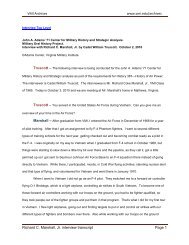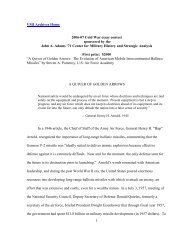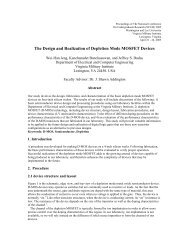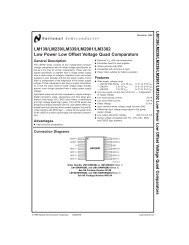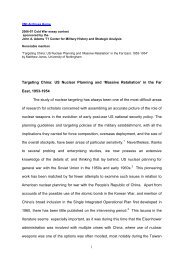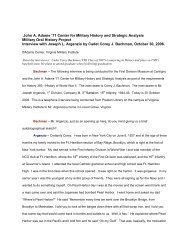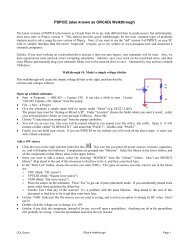Academic Catalog - Virginia Military Institute Admissions
Academic Catalog - Virginia Military Institute Admissions
Academic Catalog - Virginia Military Institute Admissions
You also want an ePaper? Increase the reach of your titles
YUMPU automatically turns print PDFs into web optimized ePapers that Google loves.
physics CURRICULUM<br />
Physics is the study of the basic laws that describe all natural<br />
phenomena, and it is often instrumental to the development of<br />
new technologies. At VMI dedicated faculty mentors help cadets<br />
develop strong analytical reasoning, laboratory, computational,<br />
and technical communication skills. They also provide our<br />
majors with the opportunity to combine skills developed in their<br />
coursework with the creativity needed to solve real-world problems<br />
in independent research projects in pure and applied physics.<br />
Mathematics is an integral part of the study of physics, and<br />
it is essential for students to come with strong mathematics skills<br />
to successfully pursue the physics major. While the physics<br />
curriculum is rich in applied mathematics, it is also a wellbalanced<br />
program with many opportunities to develop hands-on<br />
laboratory and computer programming skills and to probe the<br />
relationship between experiment and mathematical theory that<br />
is the hallmark of physics.<br />
The physics curriculum is a flexible curriculum that provides<br />
an excellent opportunity for the development of intellectual<br />
breadth while also building strong scientific and technical skills.<br />
Our degree programs offer a generous complement of electives,<br />
allowing cadets to obtain one or more minors or even to double<br />
major in select cases. This flexibility allows each cadet to point the<br />
degree along the career path that they wish to pursue. Historically,<br />
physics has been a very marketable degree that graduates use<br />
to follow a wide range of career paths in the military, industry,<br />
and in education.<br />
Our B.S. physics degree program offers solid training for many<br />
technical career paths or for graduate study in physics and other<br />
closely allied technical fields. In addition to the core curriculum<br />
requirements, it includes 15 credit hours of free electives, 6 credit<br />
hours of humanities and social science electives, and 12 hours<br />
of technical electives.<br />
Our B.S. in physics with a concentration in nuclear energy is<br />
specifically designed to prepare students for work in the nuclear<br />
power industry, the Navy’s NUPOC program, or for graduate<br />
study in Nuclear Engineering. It includes 12 credit hours of<br />
free electives, 6 credit hours of humanities and social science<br />
electives, 6 credit hours of technical electives, and 6 credit hours<br />
of physics electives (at the 300 or 400 level).<br />
Our B.A. physics degree program is well suited to the<br />
student who wants to major in physics but who also has strong<br />
interests in the humanities or social sciences. The B.A. degree<br />
program is also designed to allow those cadets interested in<br />
teaching physics at the high school level to work toward teacher<br />
certification while they complete their physics degree. With 21<br />
credit hours of free electives, the B.A. option allows a cadet to<br />
pursue a second area of study in depth, and it is expected that<br />
some of the free elective hours will be used to obtain a minor or<br />
to pursue a double major. There are also 9 hours of technical<br />
electives and 9 hours of physics electives (at the 200, 300, or<br />
400 level). Finally, cadets pursuing the B.A. are required to meet<br />
a four semester foreign language requirement or demonstrate<br />
equivalent proficiency.<br />
The department houses a generous complement of wellequipped<br />
classrooms, teaching laboratories and faculty research<br />
laboratories. The teaching laboratories include two general<br />
physics laboratories, an electronics and interfacing laboratory,<br />
an optics laboratory, and a modern physics laboratory. The<br />
department has a small accelerator and nuclear physics laboratory<br />
in the basement of Mallory Hall, and the VMI Observatory, a short<br />
drive from Post, has a 20-inch reflecting telescope and an array<br />
of smaller telescopes that are used in our astronomy courses<br />
and for faculty and cadet research projects.<br />
Faculty conduct research with cadets in laboratories devoted<br />
to organic thin film device fabrication and characterization,<br />
laser physics and fiber optics, solid state and gas phase laser<br />
spectroscopy, and astronomy. Every cadet who completes the<br />
degree program will work one-on-one or in a small group with a<br />
faculty mentor on a research project.<br />
Cadets majoring in physics and the fulltime physics faculty<br />
form a close-knit academic community in which cadets can<br />
pursue a deeper understanding of the physical world while also<br />
preparing for a broad array of career paths.<br />
MINOR IN PHYSICS<br />
A minor in physics is offered to cadets who desire to<br />
complement their major area of study with additional work in<br />
the field of physics. The requirements that must be satisfied are<br />
as follows:<br />
1. General Physics Sequence<br />
PY 160, PY 161, PY 155, and PY 156<br />
2. Modern Physics<br />
PY 335 Modern Physics I<br />
3. At least 9 additional hours of courses are required. Those<br />
courses must be selected from the following: AT 306, PY<br />
253W, PY 254, PY 308, PY 333W, PY 334, PY 341, PY<br />
342, PY 344, PY 336, PY 441, PY 446, PY 453, PY 257,<br />
PY 459, PY 460.<br />
4. A minimum GPA of 2.0 is required in all courses required<br />
for the minor.<br />
A cadet who wishes to apply for the physics minor must do<br />
so prior to the spring semester of the Second Class (junior) year.<br />
Contact the head of the Department of Physics and Astronomy<br />
for details.<br />
MINOR IN ASTRONOMY<br />
A minor in astronomy is offered to cadets who desire to<br />
complement their major area of study with additional work in<br />
the field of astronomy. The student must complete the following<br />
courses:<br />
PY 160-161 and PY 155-156<br />
AT 201 - The Solar System<br />
AT 204 - Stars, Galaxies, and the Universe<br />
AT 301 - Observational Techniques<br />
AT 306 - Introductory Astrophysics<br />
A minimum GPA of 2.0 is required in all courses required<br />
for the minor.<br />
68







